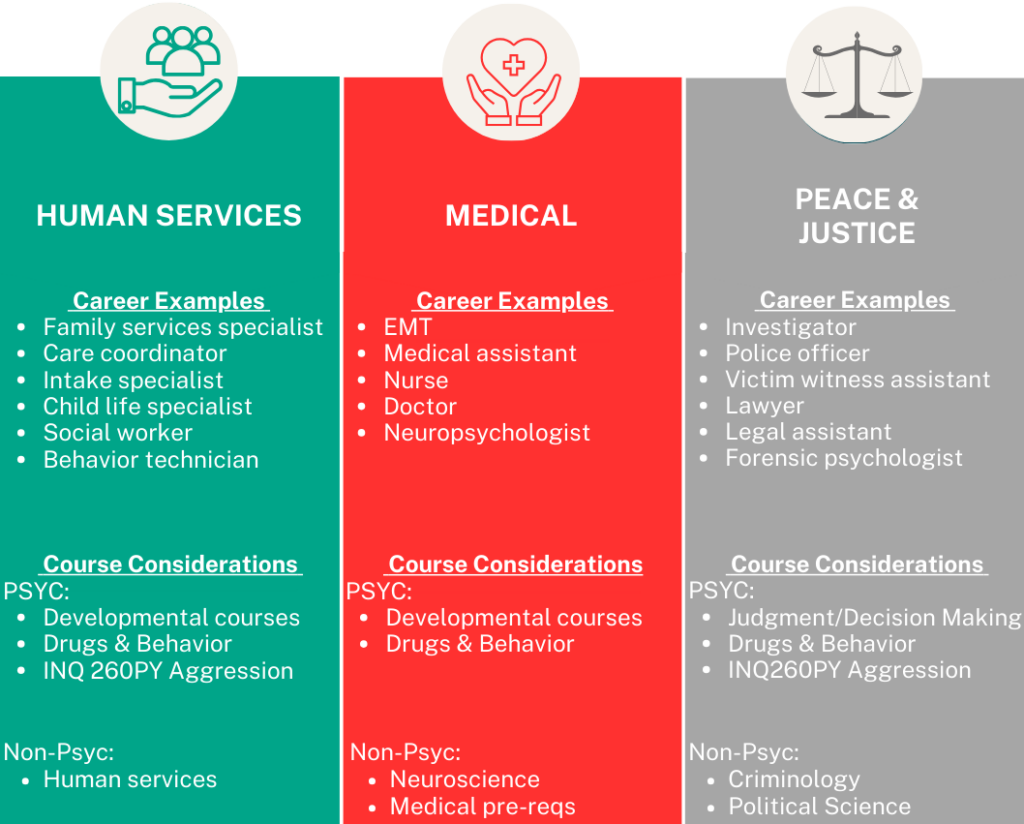Our final alumni highlight series will comprise of professionals on the career track of psychology & creativity, as well as some bonus highlights including alumni working as medical, education, research, or clinical and counseling professionals! Our bonus features intend to remind readers of a few of the many career tracks that we have shared throughout the series. As always, Roanoke students are encouraged to reach out for career advice. The Psychology Department is a great place to start — talk to your academic advisor, your course instructors, etc.! PLACE office also offers a range of resources, including career counseling, resume and cover letter assistance, job search strategies, and networking opportunities. In conjunction with PLACE, the Alumni Relations office can connect students with alumni mentors in their field of interest. Whether you’re exploring your options or preparing for your next steps after graduation, the Roanoke College community is here to support you on your journey. Check out some of the resources available to you on Roanoke’s “Preparing for Life After Graduation” webpage!
Let’s now delve into the journeys of some professionals in the psychology field as we introduce our featured alumni for this week!
Kinsey Overfelt: Resident in Counseling at Family Services of Roanoke Valley
How would Kinsey describe her role as a Resident in Counseling?
“I am a Resident in counseling which means I am working with clients every day to meet the direct hour requirements to become a licensed professional Counselor. I utilize Play Therapy to help children build self-confidence, understand their emotions, and resolve inner conflicts. I counsel all ages from 3 years old to 80 years old but my main focus is children.”
Carly Schepacarter, MA, ATR-P, LGPC: Kids Like Us Counselor within the Behavioral Health Services Department under Frederick County Government, Maryland
How did Carly become a Kids Like Us Counselor?
“I got my Master of Arts in Art Therapy from The George Washington University in 2023. While I was there, I interned as an art therapist with a residential substance abuse rehabilitation center in DC, Washington DC Public Schools, the GW Art Therapy Clinic, and worked for GW as an Academic Coach. All of these provided such valuable opportunities for me to work with clients, learn how to use art for healing, process traumatic and stressful experiences with clients, and provide ethical and competent services. Working with folks in recovery also provided me with a deeper compassion for the youth that I serve and the ones in their lives that they worry about. All of these surely nurtured my passion for the work as well. In order to get my job, I talked to as many art therapists and counselors as I could find to get advice and wisdom related to their job searching. My networking really helped, and landed me an interview, a kind recommendation, and my current position. Since graduating, I have been working towards obtaining licensure for Counseling and Art Therapy in the DMV, as well as national certification for Art Therapy. All of this has been super helpful for me to find my way in the field.”
Victoria Winnard: Independent Fiction Author
What has Victoria been working on most recently?
“I made great progress on a trilogy I’ve been working on for several years, the first two books of which can be found on Amazon under my pen name Victory Parsons – ‘The Forgotten Prince’ and ‘Forerunners.’ The final installment still needs a lot of work before it may be exposed to the public eye. The trilogy follows beings who can time travel and the tolls that such abilities can take on the mind, which basically means any major mental illness you can think of. Throughout the books, I play with other concepts like dreams, memory, consciousness, mortality, loss/grief, parenting and attachment styles, even drug abuse and some psychedelic ideas.”
Sophia Bolton Jennings: RN BSN RNC-OB in the Labor and Delivery Unit at UVA
What does Sophia appreciate most about her current position?
“I’m a high risk Labor and Delivery nurse. I assist women during their labor and birth process… I love working with students and new nurses teaching and sharing the knowledge I have learned along the way. I have grown to appreciate working at a teaching hospital because of the collaboration with different members of the medical team (Residents, RTs, pharmacist) and using new products and research that enhance our patients’ experiences. I think birth is so fascinating and I don’t think I will ever stop being in awe of the human body! I also gave birth to my first child on the unit where I work so I have an all new appreciation for my coworkers!”
Ally Brothers: Associate Professor at Colorado State University
What are some of Ally’s roles and responsibilities at Colorado State University?
“I am a fully-integrated member of our department with an 80% teaching load, 15% research and 5% service (not adjunct). I teach undergraduate and graduate courses related to adult development and aging and lifespan development, and maintain a small research program as well. I typically teach about 4 classes per semester (Fall and Spring) and 1-2 in summer. My main courses include HDFS 201 Perspectives in Gerontology, HDFS 312 Adult Development and Aging, HDFS 412 Mental, Physical Health in Adulthood, and HDFS 434 Risk and Resilience Across the Lifespan, and HDFS 613 Adult Development and Aging (graduate level)… My research focuses on the connection between the subjective experiences of aging (e.g., age stereotypes and self-perceptions of aging) and how they affect health, mental health, and longevity… I also collaborate with community partners and CSU Extension professionals to conduct community-engaged research. For instance, I am working with Extension partners on the program evaluation of a farmers’ market-based program, in which we are also developing intergenerational learning opportunities to connect college students with older adults around fresh produce and healthy aging.”
Bree Brodeur, MS, CCLS: Senior Multifamily Researcher at CoStar Group
How did Bree become a Senior Multifamily Researcher?
After earning her master’s degree from Nova Southeastern university in Program Development, she took a Child Life Exam during her clinical internship at Broward Health. She then worked as an Emergency Room Child Life Specialist at Inova Health System, and then at Bon Secours St Mary’s Hospital. She included, “I created a sensory friendly program at the hospital and started analyzing data from the sensory friendly program to make a difference in children’s healthcare experience and loved seeing results from that study so I then decided to transition into higher paying research/analyst position at costar group / apartments.com but still have the opportunity to make a difference in investor and stakeholder decisions on multimillion dollar transactions, so while it is not child development centered it still allows me to feel rewarded knowing I’m making a difference through research!”
Maya Lamprinakos: Graduate student studying Counselor Education/School Counseling and Guidance Services at Virginia Tech, and hired as a School counselor for the 2024-2025 school year in Roanoke City Public Schools
What professional journey has Maya followed following her time at Roanoke College?
“I attended Roanoke College and obtained an amazing background in psychology. I decided to attend graduate school to become a school counselor at Virginia Tech. I have become knowledgeable in group counseling, substance use, trauma-informed care, crisis intervention, expressive arts, multicultural competency, and more. I went to a job fair and was hired by Roanoke City as full-time school counselor in an elementary or middle school.”
From integrating Play and Art Therapies, to creative writing, these alumni showcase some of the many fulfilling careers that can await you following your psychology studies at Roanoke College.
We also asked our alumni to reflect on the Roanoke courses or experiences that have been most relevant to their current careers.

In terms of influential classes, alumni named PSYC-202 Research Methods, PSYC-204 Quantitative Methods, PSYC-221 Developmental Psychology, PSYC-321 Child Development, PSYC-344 Creative Thinking, PSYC-381 Abnormal Psychology, and PSYC-410 Research Seminar. Independent Fiction Author, Victoria Winnard included, “Basically I’ve incorporated a little bit of everything from the classes I took at Roanoke… Without a doubt my background in psychology has informed and deepened my writing.”

Kinsey Overflet and Maya Lamprinakos’ both shared experiences of volunteering and/or interning at the West End Center, and how that shaped their career goals and further prepared them for life after Roanoke. Maya’s volunteer work even led to an internship, and then her current job!
Additionally, Ally Brothers noted how she capitalized on experiential learning opportunities at Roanoke in saying, “Participating in Summer Scholars one year through the Honors Program and Psych department allowed me to do a deep independent study and customize my learning with close mentorship.” In reflecting on her internship, Ally added, “Dr. Jan Lynch served as the internship supervisor, and I remember that I did an internship with a brain injury rehabilitation center (such good experience). Dr Lynch and her husband invited all 15+ of us interns to their home and made us the best spaghetti with meat sauce, which we ate while gathering in their living room to discuss our internship experiences – we shared challenges, insights, and lots of laughter. The way she cared for and supported students was just remarkable!”
We understand that choosing a career path can be hard, and you will likely even change your mind somewhere along your journey! Internships are a great way to immerse yourself in a field of interest to you and discern what you truly want your future career to entail. Sophia Bolton Jennings best highlighted this in saying, “I hadn’t considered nursing as a profession until the end of my Junior year at Roanoke. I was completing an internship at a local drug rehab facility where I found myself more drawn to the nurses workflow than that of the therapist I was working with. Upon this realization I went to my advisor, Dr. Powell, and she worked with me to get my pre-reqs in order (this included a summer at Roanoke doing the anatomy and physiology intensive course – which I loved!). The following fall I completed the application process. Even though I made the decision to go to nursing school later in my undergraduate career, the process of preparing for and applying to schools was made simple by the easy access to my advisors, something Roanoke prides itself on.”
Carly Schepacarter, MA, ATR-P, LGPC shared the immensely positive impact of undergraduate research on her professional journey. She wrote, “I cannot oversell the value of my research experience with Dr. Carter, my Honors in the Major project, and the extensive classroom instruction on research was to my success. It made research less scary and something that I feel confident in. This helped immensely in my graduate program to write my thesis and complete a research class, both of which were new and stressful tasks for the rest of my program. This has also helped in my job, where we are completing a 10-year longitudinal study and once again, my research knowledge and confidence has come in handy… It’s not something to be afraid of and knowing the ins and outs of a spreadsheet, literature review, and research study is one of my most valued assets.”
Before closing out our final week of alumni highlights, we want to extend our sincerest gratitude to all of our wonderful alumni who have shared reflections on their time at Roanoke College, as well as details about their professional roles! Their stories serve as a true testament to the breadth of opportunities available after studying psychology at Roanoke College. We also want to thank you, our readers, for joining us on this journey of discovery and inspiration!
As you consider your own path, remember that your experiences at Roanoke College can provide a strong foundation for whatever career you choose to pursue. Whether you’re interested in counseling, research, education, or any other field, the skills and knowledge you gain here can help you make a positive impact in the world. Don’t hesitate to reach out to your professors or advisors for guidance as you navigate your future career path.
Get Connected!
Blog: https://psych.pages.roanoke.edu/
Facebook: https://www.facebook.com/rcpsychology
Linked In: https://www.linkedin.com/groups/RC-Psychology-8140491/about
Website: http://www.roanoke.edu/inside/a-z_index/psychology
Instagram: rcpsychology





